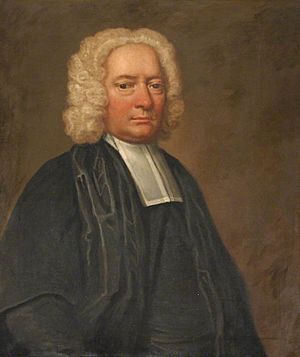Joseph Trapp facts for kids
Joseph Trapp (1679–1747) was an English clergyman, a smart academic, a poet, and someone who wrote many short articles (called pamphlets) about different topics. When he was younger, he wrote poems for special occasions and plays. This led to him becoming the very first Oxford Professor of Poetry in 1708. Later, his strong High Church beliefs helped him get important jobs and positions.
As a poet, many people at the time didn't think his work was very good. For example, Jonathan Swift once tried to avoid dinner just to escape having to fix one of Trapp’s poems. Another writer, Abel Evans, even made a joke about his translation of the Aeneid, saying it wasn't well-written.
Early Life and Studies
Joseph Trapp was born in November 1679 in Cherrington, a village in Gloucestershire. He was the second son of Joseph Trapp, who was the local church leader (rector) there. His grandfather was John Trapp.
Joseph learned a lot at home from his father. He also spent some time at New College School before going to Wadham College, Oxford, in 1695. He was a very good student, earning scholarships and graduating with a Bachelor of Arts degree in 1699 and a Master of Arts degree in 1702. Around 1703 or 1704, he became a "fellow" of his college, which is like being a senior member or teacher.
Early in his time at Oxford, Trapp started writing poems for different collections. He also wrote poems that were based on or translated from other famous works. These were included in collections by well-known poets like John Dryden. His play called Abramule also helped him become known.
Because of his writing, he became the first Professor of Poetry at Oxford. He held this job from 1708 to 1718. He gave his lectures in Latin. His ideas were quite new, for example, when he talked about how poetry is like painting.
A Strong Voice in Politics
Around the same time, Trapp became very involved in politics. He supported the Tory party and had strong "High Church" views. This meant he believed the Church of England should keep many traditional practices.
He helped Henry Sacheverell during his trial in 1709 and 1710. After Sacheverell, Trapp took over his lecturing job in Newington in 1710. Trapp wrote the introduction for a paper about the trial. He also wrote an anonymous pamphlet defending Sacheverell's journey after the trial. Another anonymous pamphlet by Trapp compared the ideas of the Tory and Whig political parties.
In 1711, Sir Constantine Phipps, a very important judge in Ireland, hired Trapp as his chaplain (a priest who serves a private household). Trapp continued to write political articles that supported his party. Even Jonathan Swift made fun of him for this.
In 1712, Trapp married a daughter of Alderman White from Oxford. He then left his job as a Fellow at Wadham College. That same year, he became a chaplain to Henry St John, 1st Viscount Bolingbroke, another important political figure. Swift said he helped Trapp get this job. In 1713, Swift didn't want to have dinner with Bolingbroke because he was expected to "look over a dull poem" by Trapp. However, he did end up correcting the poem, which was later printed anonymously as Peace, a Poem.
From 1714 to 1722, Trapp was the rector (head priest) of the church in Dauntsey, Wiltshire. This job was given to him by the Earl of Peterborough. In 1715, he also became a lecturer at the church of St. Martin-in-the-Fields in London.
In 1722, he was chosen to be the vicar (another type of church leader) for two churches in London: Christ Church, Newgate Street, and St. Leonard, Foster Lane. In 1733, Lord Bolingbroke gave him another rectory in Harlington, Middlesex. He also gave lectures in several other churches in London and became the president of Sion College.
Joseph Trapp passed away from a lung illness called pleurisy on November 22, 1747, in Harlington. He was buried there, and there are monuments to him in both Harlington and Newgate churches.
His Writings
One of Joseph Trapp's big projects was translating the famous Roman poem Aeneid by Virgil into English. The first part came out in 1718, and the full translation was published in 1731 and 1735. He wrote it in "blank verse," which is poetry without rhymes.
He also translated John Milton's famous English poem Paradise Lost into Latin. This was published in two parts in 1741 and 1744. He paid for this translation himself and lost a lot of money on it. Some people today think that by translating Virgil into Milton's style and then Milton into Virgil's style, Trapp wanted to show that Milton was like the English version of Virgil.
See also
 | Chris Smalls |
 | Fred Hampton |
 | Ralph Abernathy |


